- Home
- Edward Lee
The Black Train Page 14
The Black Train Read online
Page 14
“So? Maybe she had an appointment for an earache.”
“She had an appointment for an abortion. The way they did it back then was—” Sute peered up, mildly pained. “It’s uncomfortable to talk about, Mr. Collier. It’s an ugly, ugly story, and not one you’d want to hear before eating your lunch.”
Collier chuckled. “Mr. Sute, my life is so boring in Los Angeles I can’t even see straight most of the time. This is fascinating stuff; I’m really intrigued by it. And besides, it can’t be any grosser than the crime section of the L.A. Times on any given day.”
“So be it. If you want me to oblige you, I’ll oblige you.” The large man cleared his throat. “The way they aborted pregnancies back then was by injecting a distillation of boiled soapberry flowers into the uterine channel. This compound—very astringent—would cause a drastic PH shift in the womb, and usually result in a miscarriage within three days. The town physician’s ledger—and keep in mind, this was a private ledger, for his private activities—plainly listed Mrs. Gast’s appointment as a meeting for an abortion. And prior to that, Mrs. Gast had had three more appointments for the same procedure—at least three on the record; the ledger went back five years. Of course, she didn’t live long enough to make that fourth appointment. Harwood came home earlier than expected—and killed her.”
“How?”
Another pained look. “With an ax.”
“He axed his own wife to death, when she was pregnant?”
“Yes, and he did so in the very room she’d committed all of her infidelities. She had a special room for these trysts. It was kept locked for her—by the family maid, a slave named Jessa. I shudder to think of how many other secrets Jessa went to her grave with—though I don’t suppose she ever really had a grave, not a proper one. See, Gast murdered her, too, when he became apprised of her collusions with his wife.”
Collier peeped over his beer. “I almost hate to ask.”
“She was…well, she was left out in the fields for the buzzards and the crows.”
Sute’s pause irked Collier. “Left? You mean Gast killed her and then left her body somewhere?”
Sute finished his martini, ordered another, and stolidly replied, “Gast had her raped to death, by twenty of his most loyal rail workers. Then her body was discarded in the fields behind the house. The mass rape, by the way, took place in the same room that Mrs. Gast would be murdered in later that day—”
Raped to death. Yeah, it’s hard to get grimmer than that.
“—and I might add, since you insist on some of the more morbid details, that Mrs. Gast received similar attentions from Gast’s roughriders, while he watched, of course.”
“I don’t get it. Mrs. Gast was gang-raped to death, too? I thought you said she was killed with an—”
“She wasn’t quite raped to the point of death—this by Gast’s particular order. After a few hours, and when she was just about to give up the ghost, that’s when Gast put the ax to her.”
“Then she was dumped in the field, like the maid?”
“No. He left her body to rot in the bed. Ironic that she should die by such means in the very room whose purpose she kept hidden from Mr. Gast. No doubt those four previous pregnancies by men other than her husband germinated in that room as well, and I suspect much else.”
“You keep mentioning this room—I wonder which room it is exactly…”
“It’s on the main stair hall. Mrs. Butler doesn’t even rent that one out. Room two.” Sute looked at him. “Which room are you in, Mr. Collier?”
Collier winced at a twinge. “Room three.”
“You’re in an interesting spot, then. To your left is the room where both Jessa and Penelope Gast were murdered. And to your right, the original commode closet and bathing room.”
“What…happened there?”
“He drowned one of his foremen there, a track inspector named Taylor Cutton. Cutton had the bad luck of being one of Mrs. Gast’s secret suitors. Somehow Gast discovered this and drowned Cutton in the hip bath, among other things.”
Eew, Collier thought. I hope it wasn’t the same hip bath I saw Mrs. Butler washing herself in last night…
The topic was at last getting the best of him. When the food arrived, it smelled delicious but he only picked at it. Several more pints of Cusher’s Civil War Lager took some of the edge off the nefarious story that he’d essentially forced Sute to relate. But he did ask, “And this manuscript you wrote, the one too harsh for publishers—do you still have it?”
Sute’s face was pinkening a bit, from a third martini. “Oh, yes. It’s gathering dust on my shelf.”
“And that’s the entire story of Harwood Gast—the entire legend of the man?”
Sute nodded. “And I think a lot of it’s probably quite accurate. Most of the sources are very authentic. Whether you believe the supernatural angle or not, Mr. Collier, you can believe this: Harwood Gast was purely and simply an evil man.”
“Mrs. Butler said the same thing.”
“And she’s well advised. Some of her ancestors lived in this town when all these things were happening, and mine, too. I appreciate your interest, though. It’s quite flattering, I must say. Here’s my card.” He slipped one across the table. “If you’d like to borrow the manuscript, or browse through it, don’t hesitate to ask. But—please—call first.”
“Thanks,” Collier said. “I might take you up on that.”
“I can also show you some of the original daguerreotypes that I didn’t elect to put in any of my published books. There are a few nudes of Mrs. Gast, if you’re…interested in seeing that sort of thing.”
Collier’s brows jiggled, but then he thought, Nudes? “Oh, come on, don’t tell me she did pornography, too. They must not have even had it back then.”
“No, nothing like that, but just as aristocrats of earlier eras would have their wives painted in the nude, the same went when photography was invented. Daguerreotypes and other early forms of photography were very expensive, and reserved only for the very rich. Well, Harwood Gast may have been the richest private citizen in Tennessee back then. He had several nudes taken of his wife, for his own viewing. She’s quite a comely woman.”
Collier continued to be astounded by his interest in this. And now…Nude pix of Penelope Gast. I’ve GOT to see those.
It took another moment for the next question to click in his head. “Mr. Sute…Was anyone murdered in my room?”
“I’m quite happy to say…no, Mr. Collier.”
Collier—even though he wasn’t sure he believed any of this—was relieved.
“And there you have it, the short version anyway.” Sute’s distraction continued. He seemed to keep peering over Collier’s shoulder, out the restaurant’s plate-glass window. “I won’t bore you with certain other testimony—things said to have been witnessed in the house.”
“Finally. Ghosts.”
“Yes, Mr. Collier. Ghosts, apparitions, and every conceivable bump in the night. Footsteps, voices, dogs barking—”
“What?” Collier snapped.
Sute smiled. “Yes, as well as regressive nightmares, hallucinations—”
“What do you mean, regressive nightmares?” Collier snapped.
“—and even demons,” Sute finished.
Collier plowed his next beer. He didn’t like to be taken for a fool. Was this bizarre fat man a master storyteller? Or…
He hadn’t heard any dogs barking exactly, but he had seen one, or so he’d thought. He’d found his own sexual responses exploding…something Sute claimed to have happened to others. And the nightmare he’d had? It had regressed him back in time, all right, to a mindboggling atrocity that involved a railroad during the Civil War.
And he’d heard voices, too, hadn’t he? Children, a woman, a man.
Now this.
“Demons?” Collier asked.
“I’m afraid so.”
“Let me take a stab at it,” Collier tried to mock. “Harwood Gast was reall
y a demon, I’ll bet. To do the devil’s bidding on earth.”
Sute chuckled at the attempt. “No, Mr. Collier. It’s actually something even more contrived than that.”
“Really?”
“There’s long been the suggestion that Gast sold his proverbial soul…to a demon.”
Collier rubbed his eyebrows, if anything, laughing at himself now. That other stuff? It was just human nature, plus too much beer. He was seeing what the fabulist in him wanted to see. People make any excuse to think they’ve seen a ghost. More human nature, primal human nature. He was the Cro-Magnon listening to the scary story in the cave, and just knowing that that sound he’d heard in the woods was a Wendigo or a lost soul.
And now Sute was professing demons.
“I’m glad you said that, Mr. Sute. Because now, your story isn’t really that disturbing anymore.”
“I’m glad. You don’t believe in ghosts then?”
“No, not at all.”
“Nor in demons?”
“Nope. I was raised in a Christian family—” Collier felt an inner gag. Peeping on a sixty-five-year-old woman taking a bath, coitus interruptus with Lottie, getting drunk to the gills, plus a burning, unabated, unrepentant LUST…Jesus, what am I trying to say? “What I mean is, I’m not what you’d call a practicing Christian, but—”
Sute nodded, with a cryptic smile. “You were influenced by the faith. They say that more than half of the Americans who even call themselves Christians never even go to church.”
That would be me, Collier realized.
“But I think what you’re trying to say is that some of your upbringing, in the midst of Christian values, has remained with you.”
“Right. And I don’t believe in demons.”
“How about Christian thesis in general? Do you believe that?”
“Well, yeah, sure. The Ten Commandments, the New Testament, and all that. Blessed are the pure of heart. I mean, I guess I even believe in Jesus.”
“Then you believe in basic Christian ideology,” Sute observed more than asked.
His hypocrisy raged. I’m profane, I’m lustful, I’m gluttonous, I’m a pretty serious sinner, but, sure, I believe it. “Sure,” he said.
Sute rose, and pointed at him. “In that case, Mr. Collier, then you do believe in demons. Because Christ acknowledged their reality. ‘I am Legion, for we are many.’ And on that note, I must excuse myself momentarily.”
Collier watched him depart for the restroom.
The conversation’s shadow hovered over him. In truth, he didn’t know how to define his beliefs at all. When he turned, his vision was cut off by a pair of ample breasts in a tight white T-shirt, and a silver cross between them.
“Did I hear you right? You were discussing…Christian thesis?”
Collier looked up, slack-jawed. It was Dominique. She’d removed the apron and was standing right next to him.
Collier didn’t know how to reply. He was hypocritically claiming a Christian ideal to explain why he didn’t believe in demons? I’d sound like a complete tube steak. Dominique—at least it seemed—was a genuine Christian, not a phony. For a moment, he even thought of lying to her, just to impress her.
And she’d see through that…like I see through this empty beer glass.
Finally, he said, “Mr. Sute and I were just talking subjectively.”
“About what?” she asked in a heartbeat. A little catsmile seemed to aim down at him.
Collier tried to sound, well, like a writer. “Theoretical Christian interpretation of demonology.”
She shifted her pose, to stand with a hand on her hip. “Well, Jesus was an exorcist. He cast out demons like he was a football ref throwing penalty flags.”
Collier’s thoughts stumbled. This is the girl of your dreams, dickhead. Maintain conversation. “So…true Christians believe in demons?”
“Of course!”
“And the devil?”
“Well, Jesus wasn’t tempted in the desert for forty days by the Good Humor Man. If you believe in God, you have to believe in the devil, and the devil’s minions. Lucifer isn’t a metaphor—jeez, I’m so tired of hearing that one. He isn’t an abstraction or a symptom of mental illness.” She groaned. “God punted him off the twelfth gate of heaven—once his favorite, the angel called Lucifer—for his vanity and his pride. The friggin’ devil, in other words, is a real dude, and so are his demons. If you don’t believe in demons, then you can’t believe that Christ cast them out, and if you don’t believe that, then that’s the same as saying the New Testament is bullshit—”
Collier sat stunned, by the variety of her animated explanation.
She finished up with a nonchalant shrug. “So if a person who calls himself a Christian doesn’t believe the New Testament, that person is no Christian at all. Simple.”
Collier could’ve laughed at her diversity, or remained stunned by her conviction. Before he could comment, she asked, “So what brought this conversation on? It’s not exactly what I would expect America’s premier beer chronicler to be yakking about at lunch.”
Now Collier did laugh. “I guess some aspects of religion snuck their way into my curiosity about the town lore.”
Dominique rolled her eyes at the empty martini glass. “Oh, so he’s the one ordering umpteen Grey Goose martinis.”
Collier craned his neck up at her. Sunlight sparkled off the cross on her bosom like molten metal. “Do you…”
“What?”
“Do you believe any of it, the lore, I mean?”
Her little cat-grin dropped a notch. “Yes.”
For some reason, the tone of her response gave him a chill. Is she jerking me around?
“You only ate a smidgen of your trout cake,” she noticed. “Do I have to go back to the kitchen and kick some ass?”
Collier chuckled. “No, they’re great. But I’m a sucker for a good story, and Mr. Sute got the best of me.”
“Mr. Sute…or Harwood Gast?”
“Well, both, I guess. But you know, last night you sounded kind of into it yourself.”
She shrugged again, and tossed her hair. “I’m a sucker for a good story, too. Just, please, don’t ask me if I’ve ever seen anything at the Gast House. It’d put me in a compromising position.”
She’s as bad as Sute, or do I just have a MANIPULATE ME sign on my head?
“Anyway, I have to go now, so I just came over to say ’bye.”
Collier was wracked. “I thought you worked till seven,” he almost exclaimed.
“I just got a call from one of my distributors. I have to drive up to Knoxville and pick up a hops order. I won’t be back for several hours, and I’m sure you can’t hang around till then.”
Shit! Collier was pissed. He’d been so busy listening to Sute’s ghost stories, he’d missed his chance to talk to her. “Damn, well. I’ll come by tomorrow and give you the release form.”
“That would be great,” she said. “I really appreciate it.”
“Don’t thank me. You’re the one who makes the lager.” Collier’s mind blanked, and before he knew what he was saying, he’d already said it: “Maybe we could go out to dinner sometime…”
What! he thought. What did I just say? I didn’t ask h—
“Sure. How about tonight?”
Collier froze. “Uh, yeah, perfect.”
“Pick me up here at eight. ’Bye!”
Dominique whisked out the front door.
Collier felt like a parachutist who just stepped out of the plane. His face felt like it was glowing. I just asked her out…and she said yes!
He barely noticed when Sute’s bulk sat back down. Were the man’s eyes red? Either he’s allergic to something, Collier supposed, or the guy’s been crying.
“You okay, Mr. Sute?”
The man looked absolutely disconsolate. “Oh, yes, I just…I’ve got several personal quagmires, that I’m not quite sure how to deal with.” He ordered another big martini.
Well, that’s one
way of dealing with it, Collier thought. Even during their discussion’s peak, Sute seemed haunted, even pining for something. Could it have something to do with Jiff?
Collier knew he shouldn’t but…“Oh, yeah, that’s another thing I was wondering about. The land. Yesterday when Jiff was showing me my room, I asked him about all that land around the town. It looks like perfectly good farmland to me. But Jiff says it hasn’t been cultivated in years.”
Sute swallowed hard, nodding. But the tactic had worked; both times the name Jiff had been mentioned, Sute reacted in his eyes—the same pained cast. It was everything he could do just to respond to the subject.
“The land hasn’t been cultivated, actually, since Harwood Gast’s death in 1862. It was great land, mind you, outstanding soil. There were rich, rich harvests of cotton, corn, and soybeans for as far as one could see.” Sute’s voice darkened. “If farmers grew crops there now…no one would eat them.”
“Because the land is cursed?” Collier posed. “As I recall…Jiff said something along those lines.”
Was Sute’s hand shaking?
“Of course, Jiff didn’t say that he personally believed the land was cursed,” Collier went on for effect. “Just that that’s part of the legend.”
“It is, very much so.” Sute finally composed himself. “People believe the land is tainted for what happened on it when Gast owned it. As the story goes, he executed a vast number of slaves on that land.”
“Really? So this is fact?”
“Exaggerated fact, more than likely. Based on my own research, perhaps thirty or forty slaves were executed, not the hundreds that the legend claims. But still, men were killed there.”
“Lynchings, in other words?”
“Yes, but not by hanging, which is the standard denotation. These men were slaves, of course, there was never any trial beforehand. Bear in mind, this was the era of Dred Scott—slaves, by law, were regarded as property, not citizens entitled to the rights granted by the Bill of Rights. Therefore, slaves accused of crimes never got their day in court. They were executed summarily anytime white men suspected them of something criminal.”
“Legal murder.”

 In the Year of Our Lord 2202
In the Year of Our Lord 2202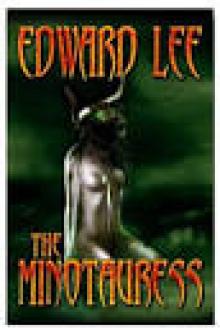 The Minotauress
The Minotauress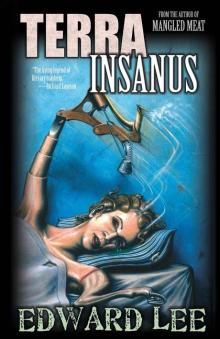 Terra Insanus
Terra Insanus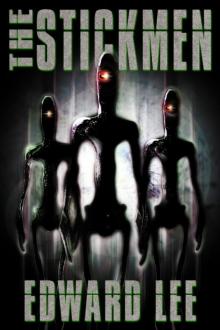 The Stickmen
The Stickmen Flesh Gothic by Edward Lee
Flesh Gothic by Edward Lee Family Tradition
Family Tradition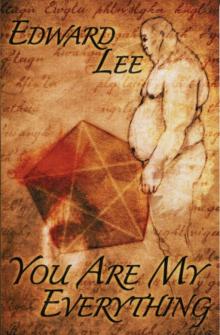 You Are My Everything
You Are My Everything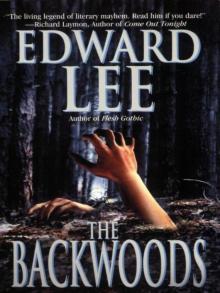 The Backwoods
The Backwoods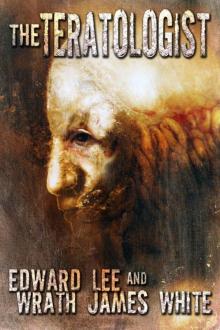 The Teratologist
The Teratologist Smoke and Pickles
Smoke and Pickles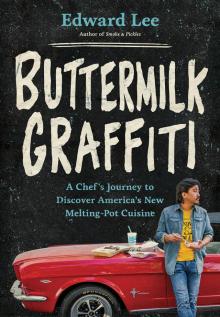 Buttermilk Graffiti
Buttermilk Graffiti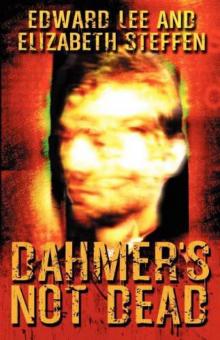 Dahmer's Not Dead
Dahmer's Not Dead Quest for Sex, Truth & Reality
Quest for Sex, Truth & Reality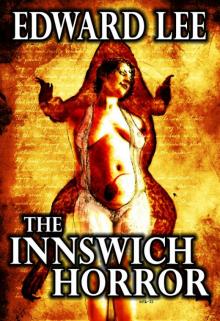 The Innswich Horror
The Innswich Horror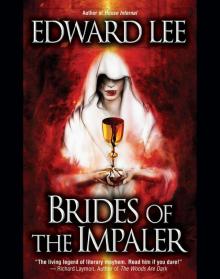 Brides Of The Impaler
Brides Of The Impaler Goon
Goon Trolley No. 1852
Trolley No. 1852 Sacrifice
Sacrifice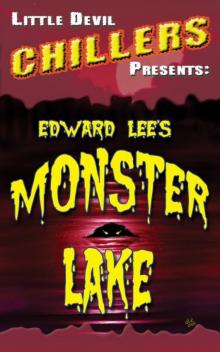 Monster Lake
Monster Lake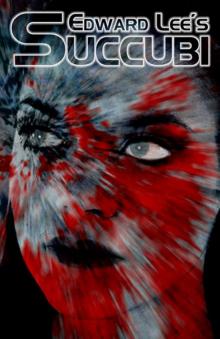 Succubi
Succubi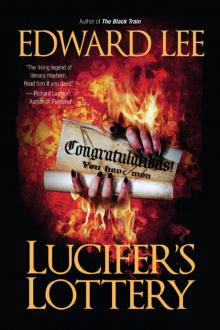 Lucifer's Lottery
Lucifer's Lottery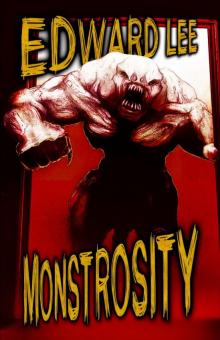 Monstrosity
Monstrosity The House
The House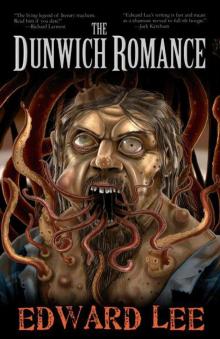 The Dunwich Romance
The Dunwich Romance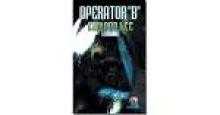 Operator B
Operator B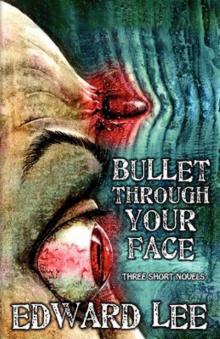 Bullet Through Your Face (improved format)
Bullet Through Your Face (improved format)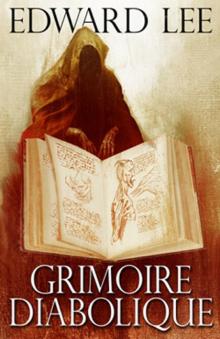 Grimoire Diabolique
Grimoire Diabolique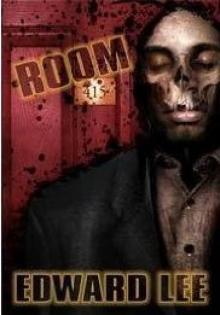 Room 415
Room 415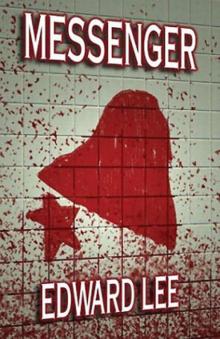 The Messenger (2011 reformat)
The Messenger (2011 reformat)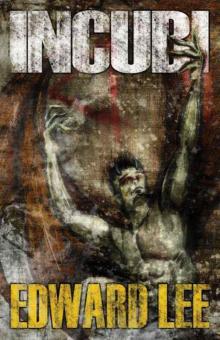 Incubi
Incubi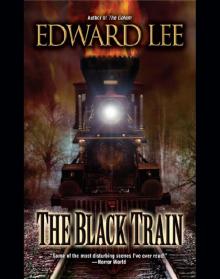 The Black Train
The Black Train House Infernal by Edward Lee
House Infernal by Edward Lee City Infernal
City Infernal Creekers
Creekers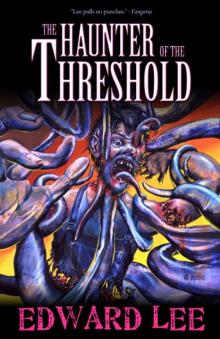 The Haunter Of The Threshold
The Haunter Of The Threshold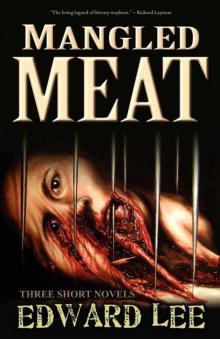 Mangled Meat
Mangled Meat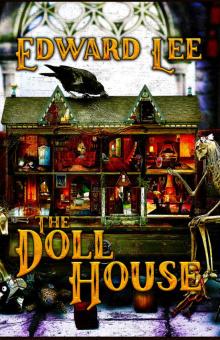 The Doll House
The Doll House Header 2
Header 2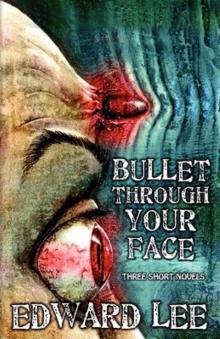 Bullet Through Your Face (reformatted)
Bullet Through Your Face (reformatted)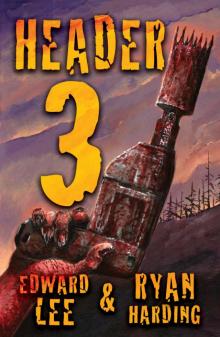 Header 3
Header 3 Infernal Angel
Infernal Angel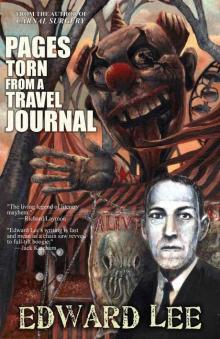 Pages Torn From a Travel Journal
Pages Torn From a Travel Journal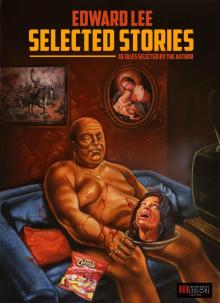 Edward Lee: Selected Stories
Edward Lee: Selected Stories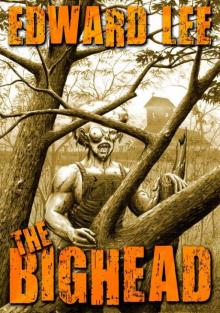 The Bighead
The Bighead The Chosen
The Chosen